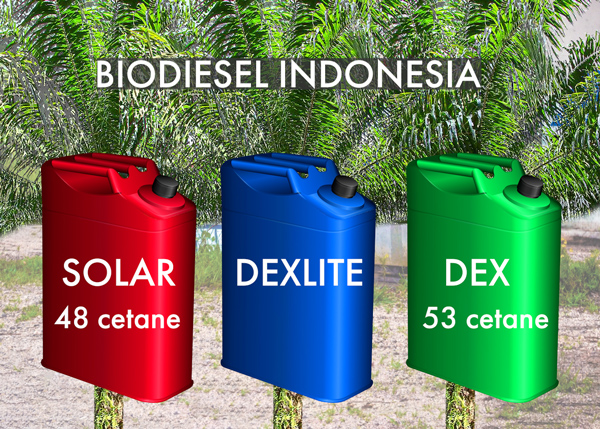Finding diesel is always a challenge in new places. But Indonesia’s notorious biofuel makes it even more confusing. We hope this post about biodiesel will help to answer some of your questions.

Navigating the World of Indonesian Biofuel
If you’re operating a diesel engine in Indonesia, you’ll quickly discover that all diesel fuel is now a form of biofuel.[1] As part of a national mandate to increase renewable energy use and support its massive palm oil industry, Indonesia requires diesel to be blended with FAME (Fatty Acid Methyl Ester) derived from palm oil.[2][3] As of August 2023, the nationwide standard is B35, a blend of 35% palm oil-based biodiesel and 65% petroleum diesel.[4] This initiative, pushed by the state-owned fuel supplier Pertamina, means that whether you fill up with the cheapest “BioSolar” or a premium grade, you are using a biofuel blend.[1][5]
Is It Safe for Your Engine?
The primary concern for boat owners and operators of vehicles with older engines is the effect of biofuel on engine components. Biofuel, particularly blends with higher concentrations of FAME, can act as a solvent.[6] This can cause the degradation of older rubber seals, gaskets, and fuel hoses that were not designed for biofuel compatibility, potentially leading to leaks.[6][7] Furthermore, reports from commercial users in Indonesia, such as bus and truck operators, indicate issues like engine sludge, increased corrosion, and more frequent breakdowns since the mandatory implementation of higher biofuel blends.[8][9] While the government and some manufacturers state that modern engines are compatible, owners of older marine diesel engines should exercise caution.[10]
Water Content and the “Diesel Bug”
One of the most significant challenges with biodiesel is its hygroscopic nature, meaning it absorbs more water from the atmosphere than conventional diesel.[11][12] This increased water content can lead to a host of problems. It accelerates the risk of microbial growth, commonly known as the “diesel bug,” which results in the formation of sludge that can clog fuel filters and pipes.[13][14] This issue is so prevalent that some users in Indonesia report having to change fuel filters as frequently as every two weeks, a dramatic increase from the six-month intervals common with pure petroleum diesel.[13] The presence of water also increases the risk of corrosion within the fuel tank and engine components.[12]
Fuel Quality and Additives
In Indonesia, Pertamina offers several grades of diesel. The most common and subsidized option is BioSolar, which has a cetane number (a measure of combustion quality) of 48.[15] Premium, non-subsidized options like Dexlite and Pertamina Dex offer higher cetane numbers of 51 and 53, respectively.[15][16] Generally, higher cetane numbers lead to more efficient combustion, which is particularly beneficial for high-speed diesel engines.[15] Pertamina states that its premium Dex fuel contains additives designed to protect the engine, which may help mitigate some of the negative effects of the biofuel blend.[1]
Recommendations for Diesel Engine Owners
Given the universal presence of biofuel in Indonesian diesel, proactive maintenance is key. It is crucial to monitor your fuel system closely. Regularly check for any signs of degrading hoses or seals. Because biofuel acts as a cleaning agent, it can dislodge old deposits from your fuel tank, so be prepared to change your fuel filters more frequently, especially after first making the switch.[6] To combat the issue of water contamination, keep your fuel tanks as full as possible to minimize condensation.[6] Regularly draining water from your tanks and considering the use of a biocide additive can help prevent the growth of the diesel bug.[14] While biofuel is a reality in Indonesia, these steps can help ensure your engine continues to run reliably.
Solar
In Indonesia, solar is still used as a generic term for diesel. But it’s also a brand name from Pertamina, the largest fuel supplier in he country.
Solar originally meant undiluted diesel, and we were of the impression that it was still the best fuel for our engine. But it turns out this is old information, because nowadays all diesel brands in Indonesia are biofuels.

What is now known as solar is the cheapest fuel you can buy, but it is only officially available to fishermen and the Navy. And it’s the impurest of them all! Solar has the lowest octane (or cetane) count at 48, compared to Dex’s count of 53.

The jury’s out on whether biodiesel from palm oil is bad for your engine. Some studies have shown that it’s not kind to traditional diesel engines. However, Pertamina claims that Dex (its premium brand) contains a number of additives that protect the engine.
We’re still having the conversation about whether we should be buying anything with palm oil in it. We don’t want to dive into that nuanced debate here, it can wait for another day!
A word to the wise: whichever type of diesel you decide to put in your engine, please keep an eye on your fuel filters. They need to be changed far more frequently than you are used to in most other countries.

Sources
- Reuters: Indonesia to raise mandatory biodiesel blend to 35% on Feb. 1
- S&P Global: Indonesia’s B35 biodiesel faces pushback from transport sector on engine concerns
- Pertamina Official Website: Get to know the types of diesel fuel at Pertamina gas stations
- Bioenergy Consult: Disadvantages of Biodiesel
- Argus Media: Indonesia’s B35 mandate to start on 1 February
- Bell Performance: Water in Biodiesel: The #1 Problem You’ll Have
- Yanmar (Marine Engine Manufacturer): Yanmar’s Global Position on Bio-Diesel Fuel Use
- Power Line (Penske): What You Need To Know About B20 Biodiesel
- Advanced Fuel Solutions: Biodiesel Problems in Engines and Storage Tanks
- The Jakarta Post: B35 fuel may damage car, truck engines: Associations
- E-नोई (e-NOE): Biodiesel and its Effects on Engine Performance and Emission
- U.S. Department of Energy (Alternative Fuels Data Center): Biodiesel Blends
- Biofuels International Magazine: Indonesian transport group raises B35 concerns
- Gold Eagle: What Is Diesel Fuel Cetane Number?
- HVO Renewable Diesel: FAME Biodiesel vs. Renewable Diesel HVO
- Hot Shot’s Secret: Biodiesel vs. Diesel Fuel
- General Motors Fleet: Diesel Fuel and Biodiesel Fuel
- The Conversation: Biodiesel can be a renewable energy source – but it’s not a simple solution for the climate
For the full episode, and a fun animation of the different types of diesel, check out episode 334 on our sailing channel.
If you like our content and would like to support us, we will give you ad-free access to our videos before they go live to the public, discounts in our shop, access to Jamie’s iconic full-res photographs, and supporter-only blog posts. Click our ugly mugs for more info!



